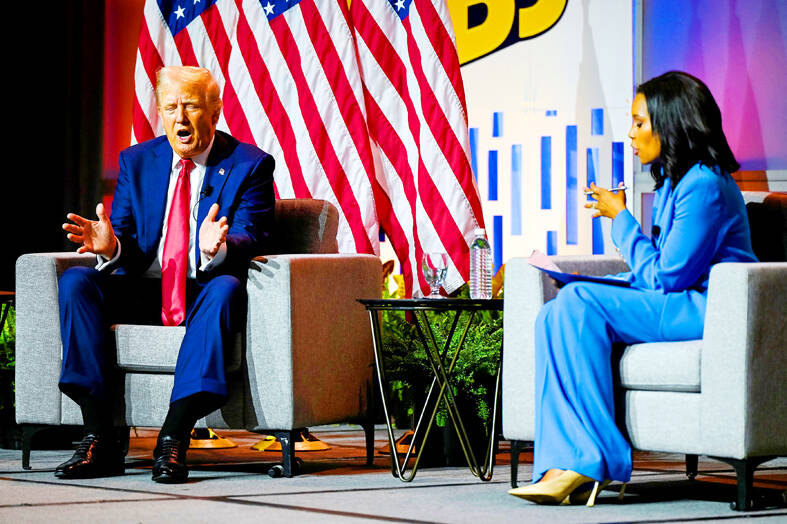Former US president and the Republican Party’s presidential nominee Donald Trump questioned US Vice President Kamala Harris’ racial identity at a contentious roundtable with black journalists, fumbling an attempt to reach out to voters of color.
Trump responded to a question about Republican attacks casting Harris as a “DEI” hire, referring to diversity, equity and inclusion, by raising her Indian ancestry.
Harris is the daughter of Indian and Jamaican immigrants.

Photo: Reuters
“I didn’t know she was black until a number of years ago, when she happened to turn black, and now she wants to be known as black,” Trump said on Wednesday at the National Association of Black Journalists (NABJ) convention in Chicago.
Harris is seeking to become the first black woman and Asian American president in US history and her entry into the US presidential contest has seen a surge of enthusiasm for her candidacy among black voters and young people — groups with which Trump has sought to broaden his appeal.
Trump’s effort to court black voters had a self-inflicted wound on Wednesday as he clashed with the event’s moderators and used vitriolic language against Harris.
Trump at one point mispronounced “Kamala,” a move he has used to elicit jeers from crowds at his campaign rallies.
His comments drew boos and gasps from the crowd, with at least one person shouting: “Have you no shame?”
Audience members also groaned when Trump said he was the best president for black people since Abraham Lincoln.
White House press secretary Karine Jean-Pierre called Trump’s questioning of Harris’ race “insulting” and “repulsive.”
Harris’ entry into the race forced Trump to shift a campaign strategy that relied on attacking US President Joe Biden’s age. Attacks from him and allies on Harris have been tinged with racist and sexist tones. Trump acknowledged he had to revamp his messaging after the president exited the race.
“Our whole campaign was geared toward him and now we have to gear it to her, but ultimately it’s the same,” Trump said.
A July Bloomberg News/Morning Consult poll released on Tuesday showed Harris erased the lead Trump enjoyed in seven states likely to determine the election, leading the former president 48 percent to 47 percent — a statistical tie.
Many swing states have significant black populations and Trump’s performance could reverberate widely in communities that could decide the election.
An NPR/PBS News/Marist poll conducted Monday last week found Harris with the support of 57 percent of black voters, compared with 34 percent for Trump.
A combative Trump took the stage more than an hour after the event was slated to begin, and criticized the moderators and the group for asking about past racist comments and a 2022 dinner with a White nationalist. Trump complained he received a “very rude introduction” and blamed audio equipment issues for the delay.
“I don’t think I’ve ever been asked a question in such a horrible manner, first question, you don’t even say hello,” Trump said to ABC News’ Rachel Scott. “I think it’s disgraceful that I came here in good spirit. I love the black population of this country.”
The roundtable was billed as an opportunity for the former president to discuss the “most pressing issues facing the black community.”

The Central Election Commission has amended election and recall regulations to require elected office candidates to provide proof that they have no Chinese citizenship, a Cabinet report said. The commission on Oct. 29 last year revised the Measures for the Permission of Family-based Residence, Long-term Residence and Settlement of People from the Mainland Area in the Taiwan Area (大陸地區人民在台灣地區依親居留長期居留或定居許可辦法), the Executive Yuan said in a report it submitted to the legislature for review. The revision requires Chinese citizens applying for permanent residency to submit notarial documents showing that they have lost their Chinese household record and have renounced — or have never

A magnitude 5.6 earthquake struck off the coast of Yilan County at 12:37pm today, with clear shaking felt across much of northern Taiwan. There were no immediate reports of damage. The epicenter of the quake was 16.9km east-southeast of Yilan County Hall offshore at a depth of 66.8km, Central Weather Administration (CWA) data showed. The maximum intensity registered at a 4 in Yilan County’s Nanao Township (南澳) on Taiwan’s seven-tier scale. Other parts of Yilan, as well as certain areas of Hualien County, Taipei, New Taipei City, Taoyuan, Hsinchu County, Taichung and Miaoli County, recorded intensities of 3. Residents of Yilan County and Taipei received

Taiwan has secured another breakthrough in fruit exports, with jujubes, dragon fruit and lychees approved for shipment to the EU, the Ministry of Agriculture said yesterday. The Animal and Plant Health Inspection Agency on Thursday received formal notification of the approval from the EU, the ministry said, adding that the decision was expected to expand Taiwanese fruit producers’ access to high-end European markets. Taiwan exported 126 tonnes of lychees last year, valued at US$1.48 million, with Japan accounting for 102 tonnes. Other export destinations included New Zealand, Hong Kong, the US and Australia, ministry data showed. Jujube exports totaled 103 tonnes, valued at

BIG SPENDERS: Foreign investors bought the most Taiwan equities since 2005, signaling confidence that an AI boom would continue to benefit chipmakers Taiwan Semiconductor Manufacturing Co’s (TSMC, 台積電) market capitalization swelled to US$2 trillion for the first time following a 4.25 percent rally in its American depositary receipts (ADR) overnight, putting the world’s biggest contract chipmaker sixth on the list of the world’s biggest companies by market capitalization, just behind Amazon.com Inc. The site CompaniesMarketcap.com ranked TSMC ahead of Saudi Aramco and Meta Platforms Inc. The Taiwanese company’s ADRs on Tuesday surged to US$385.75 on the New York Stock Exchange, as strong demand for artificial intelligence (AI) applications led to chip supply constraints and boost revenue growth to record-breaking levels. Each TSMC ADR represents